A LAUNG KHIT (SHAN FOLK LORE STORIES, 1902) BY WILLIAM C. GRIGGS
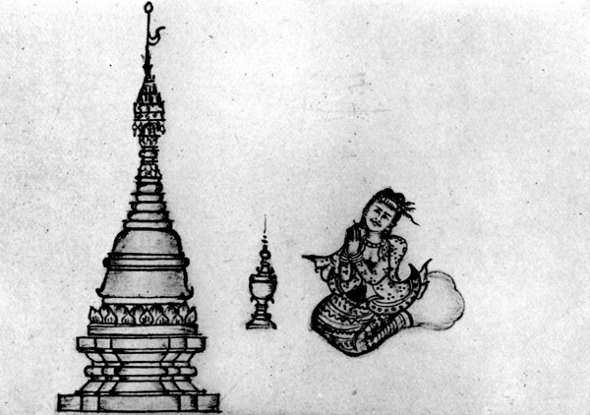
ONCE upon a time there was a woman who lived in the State of Lai Hka. She was a very pious woman and always gave the best rice and puc to the priests as they walked, rice chattie in hand, through the city in the early morning. Every year when the girls and boys went to the river and filled their chatties with water to throw over the pagodas and idols to insure a good rainy season and abundant crops, she always had the largest bucket of the clearest water and threw it higher than anybody else. She carried the sweetest flowers to the zayat every evening, and on worship days took rice in the prettiest of cups made of banana leaves and offered to the Gautamas in the idol-house.
But she was not happy. When her neighbors went to the pagodas they had their little ones tied upon their backs or running at their sides, but she had no child whom she could take with her, none to whom she could tell stories of the great Lord Sa Kyah who rules over the spirits in the hpea country, and so she was sad. She was getting old too, and often envied the women who lived near who had bright boys to run errands and girls to help in the house. Each year at the Feast of Lights, when she sent her little candle floating down the river, she prayed for a child, but in vain.
At last she made a pilgrimage to a pagoda where folks said was a parah who would give anything that was asked of him. Bright and early she set out, and on her head as an offering she carried an image of a tiger and one of a man, and when she arrived at the pagoda she offered the images and prayed for a son.
While she was praying at the pagoda, Lord Sa Kyah heard her, took pity on her, and promised her a son. But, alas! when he was born, to his mother’s great sorrow, instead of being the beautiful boy she hoped for he was nothing but a frog.
Lord Sa Kyah in order to comfort her, however, told her that her son was really a great hpea, and that after one year and seven months he would change into the most handsome man in all the hill and water country.
All the women scoffed and made fun of the poor mother, and all through the village she was called Myeh Khit, or “Frog’s Mother,” but she bore their jeers in silence and never reviled in return.
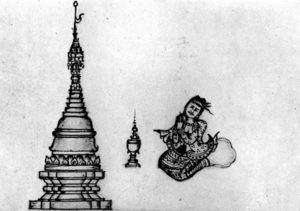
Now the king of the country had seven daughters. All were married except one, and one day Myeh Khit went to him to ask for this daughter in marriage for her son. The king was of course very angry that she should ask that his only remaining daughter should marry a frog, but he spoke deceitfully, called his daughter and asked her if she would be willing to accept a frog for a husband. Like a dutiful daughter she told him that she would “follow his words” and do as he wished, as she had no will apart from his.
The king then called the woman and said: “O woman, I will give my only remaining daughter to your son, but I make one stipulation. You must build a road, paved and properly built, from the market-place to my palace; the sides must be decorated with painted bamboos, and the work must be done within seven days or you shall die. Now go, and prepare for the work, and at the end of the seven days I will make ready the marriage feast for my daughter or order the executioner to take off your head.”
In great distress Myeh Khit returned to her home and sat down on the floor of her house and wept. All day long she bewailed her hopeless condition. In vain her son asked her the cause of her sorrow. Afraid of grieving him she would not tell him; but at last when six out of the seven days had passed, and knowing the fate that awaited her on the morrow, she told him how she had gone to the king with her request, and the time being almost expired, that she must make ready to die on the morrow.
“The executioner’s sword has already been sharpened, my son,” she said, “and to-day in bazaar they were talking of it, and promising to meet one another at the palace to-morrow when the sun should be overhead.”
As a last resource she made ready food and sweetmeats. She took paddy and placed it over the fire till the heat broke the husks and the pure white grains appeared. These she mixed with the whitest of sugar, and as she was too poor to own plates, she went into the jungle to where the new bamboo was bursting through its green prison, and taking the broad coverings of the new leaves she fashioned them into dishes and offered them with many prayers for help to Lord Sa Kyah.
“Our lord knoweth that my son can do nothing,” she cried. “He has not even hands to help, and what can our lord’s slave do to avoid the great trouble to which I have arrived?”
That night in the lovely hpea country the mighty Lord Sa Kyah reclined on his golden throne of state. By and by the velvet mat became so hot that he could sit upon it no longer, and looking down he saw, squatting before him on the floor, a frog.
“O our lord,” said the frog, “I come to remind our lord that he is his slave’s father. My mother, our lord’s slave, has arrived at great sorrow, and unless our lord pities us and takes compassion on our lord’s slave, she will arrive at destruction to-morrow. Graciously do this act of kindness, O chief of all the hpeas.”
Lord Sa Kyah took pity on his son and promised to help him. The four strongest spirits in his kingdom were four hpeas. They were twins and the name of the first two was Nan Ta Re and that of the second Hte Sa Kyung. These powerful spirits he ordered to complete the road during the night.
The next morning when the king arose he looked forth from his palace and a most wonderful sight met his gaze. He rubbed his eyes, for he believed they deceived him. He pinched himself to see whether he was really awake or whether he was dreaming. For a wonderful thing had happened during the night, so wonderful, in fact, that one cannot be surprised that he thought it unreal.
From the bazaar to the very gate of the palace was a broad, smooth road. On each side were brick walls covered with the whitest of cement, and decorated with the heads of lions, and two large griffins, built of brick and covered also with cement, guarded the entrance. They were more than twelve cubits high; their mouths were wide open and showed their terrible fangs, and their eyes looked upon the king with a stony glare. The road was paved with blocks of stone cut as smooth and laid as true as the cells of a honeycomb. There was one road for men, one for oxen, and yet another for horses. Zayats had been built here and there so that travelers aweary could rest and be thankful, and over all was a wide canopy of white cloth that extended entirely from end to end and from side to side to protect the king from the sun when he should move along the road to observe its wonders more closely.
In utter amazement he beat the gong that hung ready to his side with such vigor that amats, soldiers, attendants, and the people from the city, came rushing out of their houses to the palace gates expecting at least that the neighboring prince with whom they had long been at war had taken the city by surprise; but they, like the king, stood transfixed and speechless with wonder when they saw the road with its carvings and zayats and the canopy with the golden border spread above all.
The king called Myeh Khit. She came, and hidden in her turban was her son. The king had thought to punish this presumptuous woman by giving her an impossible task to do with a penalty that put her beyond the power of offending again, and was of course angry and disappointed that his scheme had been unsuccessful; but the occurrence had become the common talk of the market-place, and so he was obliged to carry out his part of the bargain, although it had gone contrary to his expectation and desires. So, much against his will, he called his daughter and gave an order that for seven days there was to be a feast in honor of the marriage of the princess.
But when the rejoicings of the people were finished, Khit was not given permission to live in his father’s palace but was sent with his wife and mother to live in the old house where he had been born.
Six days after the marriage there was a feast at the pagoda, and the six daughters of the king went in state.
They rode upon royal elephants; dancers danced before them; the golden umbrellas protected them from the sun; and everybody fell upon their knees and clasped their hands as the august personages went along. Their retinue filled the street when they stopped at the little house where their sister lived.
“O sister,” they called, “are you coming to the feast?” but the poor girl in great shame told them she could not come, and when they had gone, she sat on the floor with her face in her hands and gave way to her grief.
While she was sobbing, her husband approached and told her not to be sorrowful. “My father is the great Lord Sa Kyah,” said he, “and he will give me anything I ask, so do not say, ‘I am ashamed to go, as I have only a frog for a husband.’ You shall yet see your proud father and unkind sisters bowing before you and offering you presents as they offer to gods.”
Seeing how distressed the poor girl really was, the Lord Sa Kyah took pity on them and descended to earth. He brought with him wonderful white clothes such as the hpeas wear. They were brighter than the stars that shoot across the sky at night, or the lightning that flashes over the heavens during the hot season. He also gave them a magic stone, which if placed under their tongues, would enable them to fly wherever they wished.
The next morning was the last day of the feast when the boat races would be rowed, when the horses of the king and his chief amats would race for prizes, when the best jugglers would show their most wonderful tricks, and the best dancers would dance under the booths. In the midst of the fun and excitement a great shout rent the air: “The mighty Lord Sa Kyah is descending!” and right in the middle of the feasting there was a flash of brilliant light and two wonderful beings alighted. They were clothed in dazzling white, and flew swifter than when a kingfisher darts from a tree toward its prey in the water.
Every one came crowding around as near as they dared, and upon their knees offered presents of food to the wonderful beings.
First and foremost came the princesses, who bowed till their foreheads touched the dust; they lifted their clasped hands over their heads and turned away their faces while they offered the sweetest and most savory food to the visitors. But it was noticed that although the spirits ate the food offered by the amats and common people, they would not eat that given by the princesses, but wrapped it up and placed it on one side.
The next day the princesses came to their sister’s house and derided her. “O wife of an animal,” they cried, “you would not come to the feast, and so you lost the chance of seeing the mighty Lord Sa Kyah descend from the hpea country,” and then they told of the wonderful sight, and again made fun of their unfortunate sister.
Khit’s wife smiled at them and then she said: “It is you who are unfortunate, not I. My husband is not the ugly animal you think him to be, but is a great and powerful hpea. It was not the Lord Sa Kyah who descended yesterday, but his son, my husband, and myself, and to prove my words, whose are these?” and she produced the very bundles of food that her sisters had offered the day before to the supposed ruler of all spirits.
The sisters were surprised to see that she had the food there, but they laughed her to scorn when she told them of her husband.
In order that his son should become mighty and famous, the Lord Sa Kyah sent one of his attendants to the king, and caused him to give an order to his children that they should have a boat race. The one who reached the winning post first and carried away the flag on its rattan pole was to be king in his room, and the one who came in last was to be slave to the fortunate one.
There were great preparations among the servants of the six princesses, and many wagers were made as to who would be successful, but none wished to wager as to who would come in last, as all knew it would be the youngest sister.
“She has no boat,” said they, “and has no servants to make one, or money to buy one. Even if she had, what could she do? Her husband has no hands, how could he row against and defeat the swift boatmen who have been called by the princesses?”
The king gave seven days in which his daughters were to prepare for the race, and during that time the shouting of the various crews as they practised on the lake was heard from early morning till the sun dropped behind the mountains, but only six boats were seen.
The race was to take place on a lake at the outskirts of the city, and on the morning of the seventh day, when the six princesses took their stations they were surprised to see that there was a seventh boat there, but they did not know that it was a magic boat sent by the Lord Sa Kyah from the hpea country, and that the sixteen rowers were not men, but hpeas.
The course was over a thousand cubits to a post, around it, and return, and so fast did the magic boat glide through the water that it had covered the entire distance and the captain had laid the flag at the king’s feet before any of the other boats had reached the first pole that showed half the distance.
But something even more wonderful than that had taken place. During the race, the time set apart during which the son of Myeh Khit was to have the form of a frog had expired, and, lo! he was now the most handsome man in all the hill and water country. He had a crown of gold upon his head, and the magic white clothes such as only hpeas wear were on his person. His wife was clothed in as beautiful a manner, and the king, at last seeing the mistake he had made in treating him so badly, knelt on the shore and asked: “Which lord is the son of his slave?” by which he meant, which of the lords was the one to whom he had given his daughter.
But the Lord Khit, as he was now called, did not take a mean revenge on his unkind brothers and sisters, and when they came on their knees begging for their lives, and asking the privilege of being his slaves, he took compassion on them, and instead of ordering them to immediate execution, made them his amats.
This is why the Shans who live in the hill and water country worship Sau Maha Khit.
If you liked this story, leave me a comment down below. Join our Facebook community. And don’t forget to Subscribe!
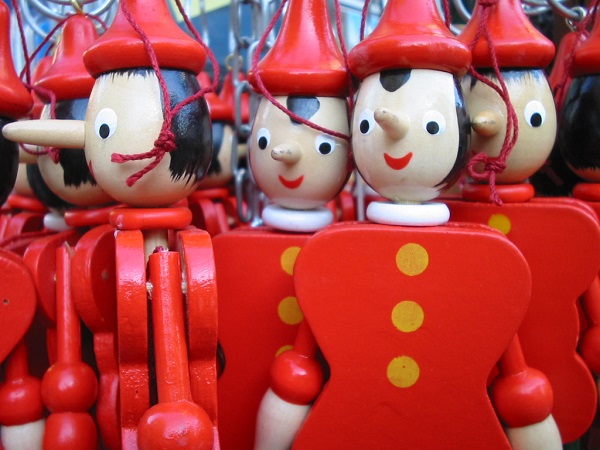



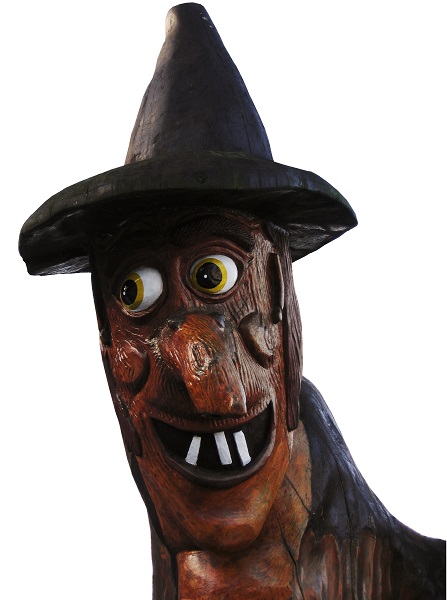
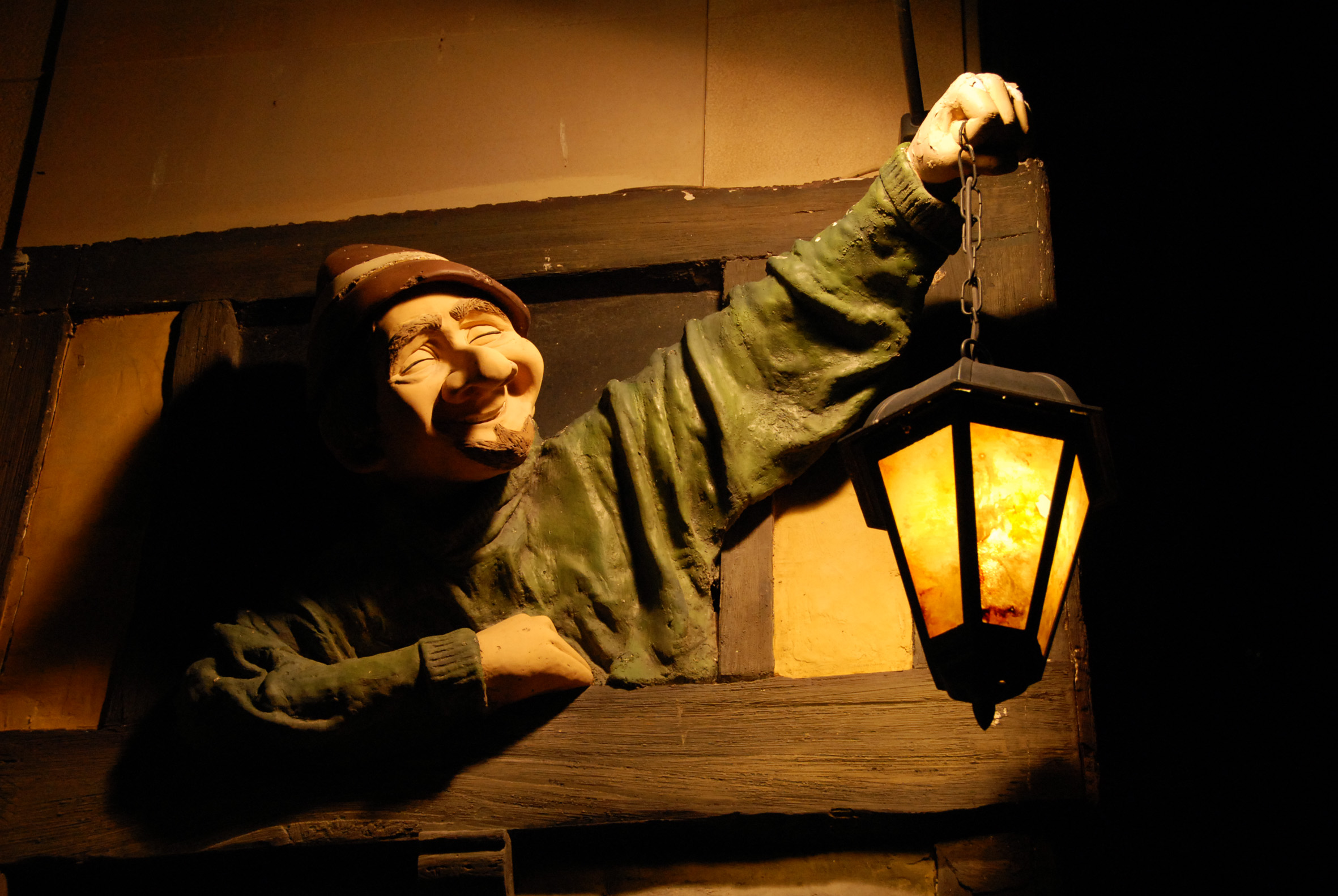








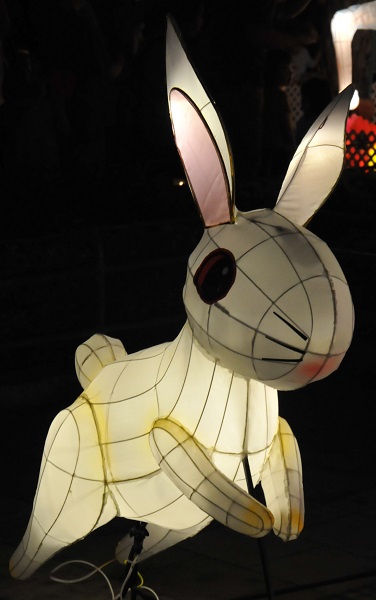




1 Response
[…] A LAUNG KHIT (SHAN FOLK LORE STORIES, 1902) BY WILLIAM C. GRIGGS features a race with very special conditions. The one who reached the winning post first and carried away the flag on its rattan pole was to be king in his room, and the one who came in last was to be slave to the fortunate one. […]